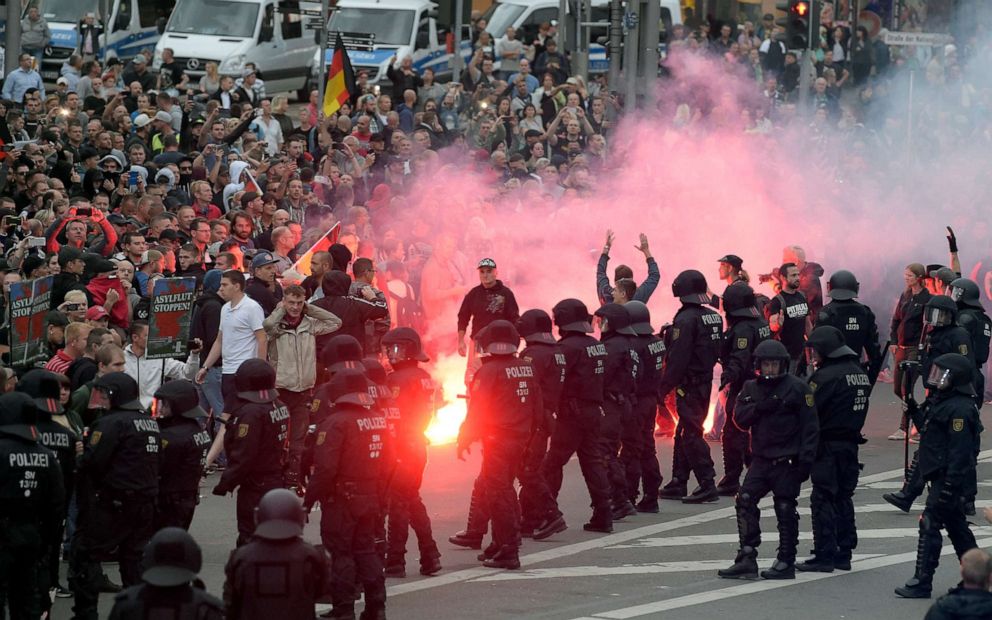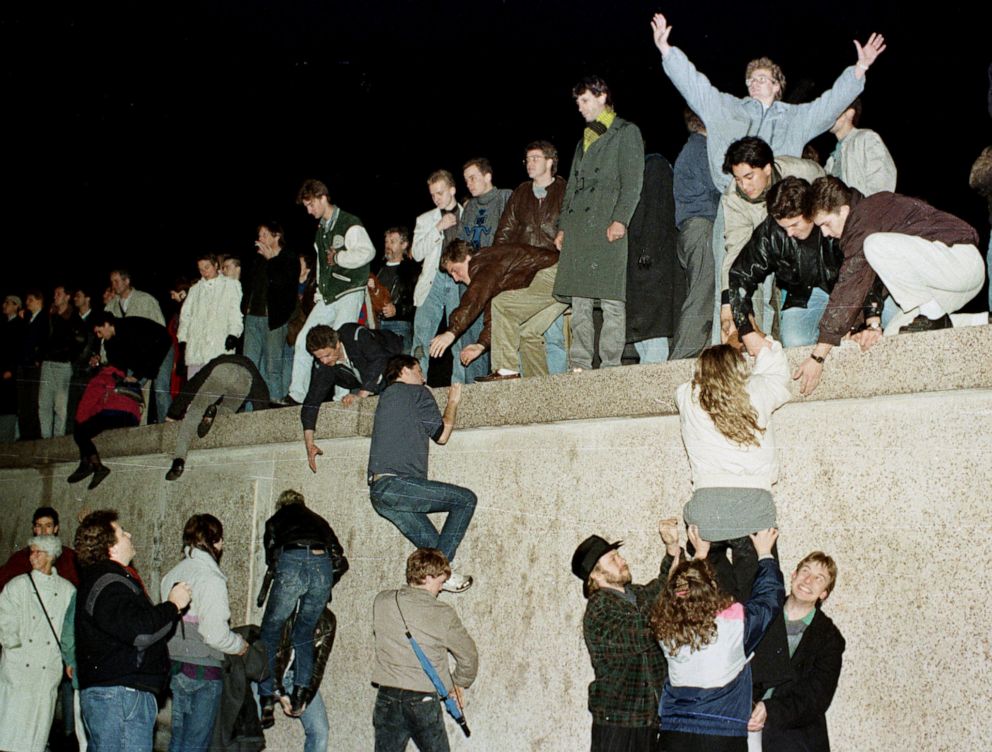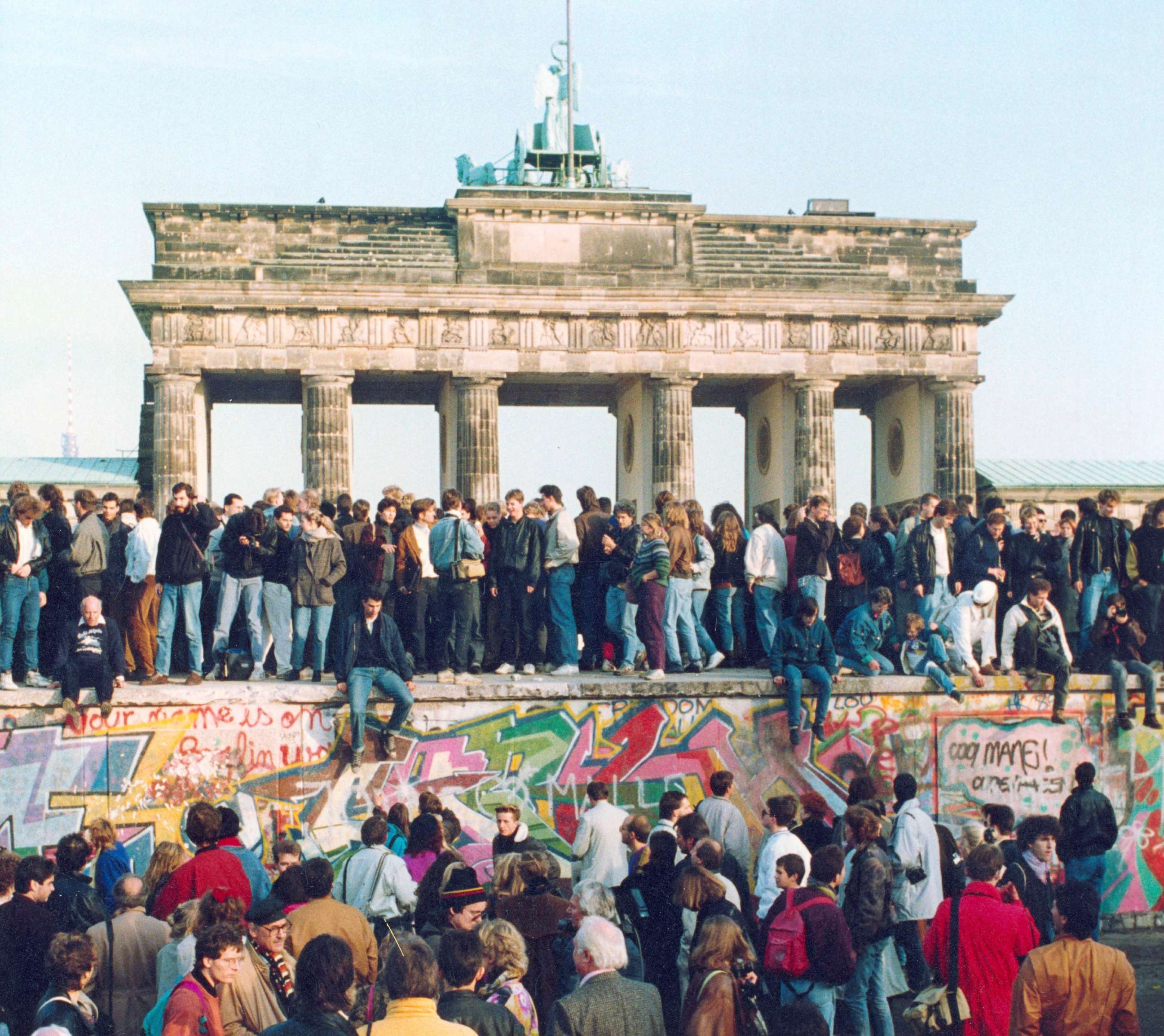30 years after the fall of the Berlin Wall, right-wing extremism is on the rise as the East lags behind
The far-right AfD party continues to be successful in Germany's former East.
BERLIN -- In the evening hours of Nov. 9, 1989 the world watched as East Berliners climbed over the wall for the first time, celebrating a newfound hope and freedom.
The wall came down peacefully -- and in Germany, the date is celebrated as the Peaceful Revolution. British historian Timothy Garton Ash called 1989 "The best year in European history" in a podcast released with the German Marshall Fund last week. It was, as he said, "the almost entirely peaceful dissolution of a nuclear armed post totalitarian empire; empires don’t normally collapse peacefully."
Yet, 30 years on, that dream of democracy may slowly be turning to disillusionment.

Although the wall is down, in many ways the boundaries between East and West Germany still exist. Economically speaking, the former East Germany still lags behind the western half of the country. Many former East German states were hard hit by economic downturn after reunification and wages and pensions are still lower.
Enter the anti-immigrant far-right party Alternative for Deutschland, which has been most successful in the Eastern part of the country. Running on an anti-Islam, Euro-skeptic platform, the party has benefited from fears of foreigners, picking up protest votes by those who feel left behind by the centrist parties that have long dominated German politics, including Angela Merkel’s Christian Democrats.
While the environmentally focused Green Party has also been making gains, the growing phenomenon of right-wing extremism and the success of the AfD in the eastern half of the country can no longer be ignored by policymakers.
October’s regional elections in the eastern state of Thuringia sent shock waves throughout the country when Merkel’s Christian Democratic Union was outvoted by the socialist left-wing party, Die Linke, followed by the AfD, which gained 23% of votes. The majority of voters under age 30 chose the AfD, according to official polling statistics, suggesting a new, younger generation that hasn’t lived through the division of its country is in agreement with the far-right party.
The fact that Thuringia’s AfD party leader, Bjoern Hoecke is currently under investigation by federal intelligence agencies for extremist speech, which has included questioning Germany’s culpability in World War II, has not seemed to detract from his success. He has denied the existence of Nazi speech when questioned about using words associated with the Third-Reich, including "Lebensraum" or "degenerate," as in a recent interview with German broadcaster ZDF.

Last week, the city of Dresden declared a "Nazi emergency" to highlight the city’s increasing problem with right-wing extremism. Passed by the Dresden City Council, the motion aimed to highlight the gravity of the growing problem of right-wing sentiments and violence and to ask the federal government for more resources to fight it. "We have a Nazi problem in Dresden and have to do something about it," Max Aschenbach, a councilor for Die Partei, a satirical political party, who initiated the measure, told the council in his speech.
Dresden is the birthplace of xenophobic citizen's organization Pegida, which stands for "Patriotic Europeans against the Islamization of the West" and has at times drawn thousands of supporters to weekly marches in the five years since it began.
Radical currents have long existed in eastern Germany, said Anetta Kahane, who runs the Amadeu Antonio Foundation which works to combat racism, right-wing extremism and anti-Semitism throughout Germany. "Everything isn’t sunshine 30 years after the fall of the Berlin Wall" she said, speaking to a group of journalists at the launch of the Yougov and Open Society Foundation study last Monday. Parties like the AfD, she said, build on attitudes previously held in East Germany.
A right-wing extremist protest culture began to grow in the 1980s in the former communist East, drawing members from the football hooligan scene. After the wall came down in 1989, right-wing radicalism boomed in former East Germany. Riots in 1991 and 1992 in cities of Rostock and Hoyerswerda saw racist participants attacking refugee shelters and hostels of foreign guest workers. Right wing-extremist activities continue today with the 2018 xenophobic riots in Chemnitz or the anti-Semitic attack on a synagogue in Halle which left two people dead in October serve as prescient examples.
According to Germany's domestic intelligence service's annual report released in June, the arrival of nearly 2 million asylum seekers since 2015 has emboldened far-right extremists motivated by racism, anti-Semitism and anti-democratic values. Violent anti-Semitic crimes in 2018 were up 71% from the previous year, stated the report. In June, pro-immigration politician Walter Luebcke was killed by a right-wing extremist outside his home.

One reason for this trend towards extremism in the former East is simply a historical lack of civil society infrastructure, says Kahane. "In the West there are large churches, and labor unions: powerful institutions that ensure a certain kind of social stability. In the East after reunification, we didn’t have that," Kahane said. "Civil society infrastructure has to be built from the ground up and be made stable so that they can withstand right-wing extremism."
Her organization sets up counseling centers for victims of racism, puts on awareness campaigns and works with local institutions to strengthen democratic processes -- in the former communist East as well as the West.
"I’m happy the wall is gone -- and I felt like that then" Kahane, an East Berliner, told ABC. "But how things have developed is a bit like something out of a nightmare. However, she stresses that society cannot afford to be pessimistic. "One has to work on finding concrete solutions and do one’s best."




